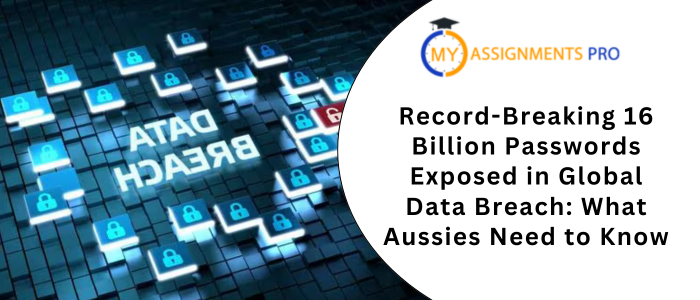
In a shocking revelation that has set off alarm bells across the digital world, researchers from Cybernews have uncovered what may be one of the most alarming cybersecurity incidents in history — over 16 billion records of login credentials have been exposed online. From Facebook and Google to Apple, GitHub, Telegram, and even government services, no platform appears immune.
This breach isn't just about numbers — it represents a new scale of cyber vulnerability that could affect millions of Australians.
A Breach of Unprecedented Scale
The data breach, initially uncovered and reported by Cybernews on June 18, has since been updated with commentary from leading researchers, including cybersecurity expert Bob Diachenko and Cybernews’s own Aras Nazarovas. The figures are staggering: more than 30 separate data sets, each containing tens of millions — and in some cases, billions — of records were discovered, totalling 16 billion login credentials.
To put that into perspective, that's enough data to account for two credentials per person on the planet.
While only one of these data sets had been reported before — a relatively small collection of 184 million records highlighted by Wired — the newly found collections far surpass it. The largest single data set alone contains over 3.5 billion records and appears to target a Portuguese-speaking demographic.
How Did This Happen?
The source of the breach isn't a single compromised system, like Facebook or Google itself, but rather a wide-scale compilation of data stolen through infostealer malware. This type of malicious software is used to extract sensitive information from unsuspecting users' devices — including passwords, cookies, tokens, and even browser autofill data.
Many of the exposed data sets were stored on unsecured Elasticsearch databases or cloud-based object storage services — effectively left out in the open for anyone savvy enough to find them. They were accessible for only a short period, just long enough for researchers to grab them before cybercriminals could exploit the contents.
These leaks were not from outdated hacks being recycled. Most of the data was recent and highly structured, meaning it could be directly weaponised by cyber attackers.
What Information Was Exposed?
The data included URLs, login usernames, and passwords — the essential ingredients to gain unauthorised access to any online service. Some records also featured session tokens and cookies, which are particularly dangerous as they can bypass two-factor authentication (2FA), granting attackers direct access without needing to enter a password again.
Among the troves of exposed data were login credentials associated with major tech services such as:
- Apple
- Zoom
- Twitch
- GitHub
- Telegram
- Various government platforms
Cybernews researchers stressed that the presence of login URLs to these services doesn’t mean those companies were directly hacked — but that millions of individual users’ credentials related to these platforms were compromised via infostealers.
Could Australians Be Affected?
Absolutely. Given the global nature of infostealer malware, Australian users are just as likely to be impacted as anyone else. From students logging into university portals to workers accessing corporate cloud tools, many Aussies use the same credentials across multiple services — a practice that’s especially dangerous when leaks like this occur.
Notably, a previous major breach dubbed the Mother of All Breaches (MOAB), discovered earlier in 2024, contained an unbelievable 26 billion records. Now, this newest discovery shows the issue is not slowing down — it’s growing.
Why This Is a Big Deal
The volume of records is only part of the problem. The real concern lies in how cybercriminals can use these credentials. With access to email accounts, social platforms, and even business tools, attackers can:
- Launch phishing campaigns that appear extremely convincing
- Commit identity theft and financial fraud
- Break into corporate networks, potentially leading to ransomware attacks
- Perform Business Email Compromise (BEC), tricking organisations into wiring funds
According to Aras Nazarovas, the leak indicates a shift in how cybercriminals share data. Where once infostealer logs were primarily traded in Telegram groups, now they're being dumped in traditional, more accessible databases — making it easier for anyone with malicious intent to grab sensitive info.
How Can Aussies Protect Themselves?
While the scale of this breach is unprecedented, there are still practical steps Australians can take to protect themselves:
- Use a Password Manager: Apps like LastPass, Bitwarden, or 1Password can generate and store strong, unique passwords for each service.
- Enable Multi-Factor Authentication (MFA): This adds a layer of protection that can block unauthorised access, even if a password is compromised.
- Regularly Change Your Passwords: Especially for email, banking, and social media accounts.
- Monitor Your Accounts: Be on the lookout for suspicious logins or account activity.
- Avoid Reusing Passwords: Even between seemingly harmless services.
- Scan for Malware: Run regular scans for infostealers using reputable antivirus tools.
If you notice any unauthorised access or changes in your accounts, contact customer support immediately to secure them.
A Broader Problem: Corporate Accountability
One of the more troubling aspects of this leak is just how common such data breaches have become. It’s no longer a question of if your data will be leaked, but when.
As one Redditor put it bluntly: “Start holding the data holders accountable, and I bet these leaks and hacks start getting a lot less frequent. Now it only hurts whoever's PR if they get hacked. Start making them fiscally or criminally responsible, and they'll secure our info much better.”
Australians must begin demanding higher standards from both public and private entities. Under the Privacy Act 1988, companies operating in Australia are already required to protect personal information. But as the digital world grows more complex, these protections must evolve — and enforcement must be robust.
What Next?
We’ve already seen similar massive leaks before — from RockYou2021’s 8 billion passwords to RockYou2024’s nearly 10 billion. This new breach of 16 billion shows that attackers are becoming bolder, and that our security practices have not caught up.
It’s critical that users, businesses, and governments around the world — including here in Australia — treat this as a wake-up call.
This isn’t just an abstract global issue — this is about your personal data, your family’s information, your business operations. It’s time to take security seriously.
Final Thoughts
While we can’t reverse the leak, we can control how we respond to it. Update your passwords, enable 2FA, and spread awareness. The more informed Australians are, the harder it becomes for cybercriminals to take advantage.
Cyber threats may not be going away, but together, we can build a more secure digital future — one strong password at a time.
Affordable & Trusted Assignment Help Tailored for Students
Struggling with tight deadlines or complex academic tasks? My Assignments Pro provides reliable assignment help designed to support you at every stage of your studies. We specialise in customised assignment help across a wide range of subjects, including business, law, nursing, finance, and more. Our expert writers deliver original, thoroughly researched content that meets your university’s academic standards. With affordable pricing, timely delivery, and special discounts on bulk orders, we are your dependable partner for all types of assignment help—from essays and case studies to technical reports and advanced projects.
Source
Mitchell
Mitchell is a seasoned Ph.D. scholar with extensive expertise gained through years of rigorous research, publication, and teaching experience. He brings a wealth of knowledge and analytical skills to tackle complex academic challenges. His work is dedicated to delivering innovative solutions, advancing knowledge, and promoting academic excellence. Proficient in research methodology, data analysis, and scholarly writing, Mitchell has contributed to peer-reviewed journals and mentored students to achieve academic success.


